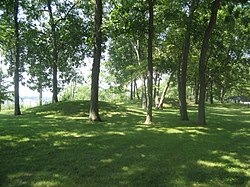Sinnissippi Site | |
 | |
| Location | Sterling, Whiteside County, Illinois |
|---|---|
| Coordinates | 41°47′50″N 89°39′35″W / 41.79722°N 89.65972°W |
| Area | 6 acres (2.4 ha) |
| Built | c. BCE 1 |
| Architectural style | Burial mound |
| NRHP reference No. | 79000874 [1] |
| Added to NRHP | May 14, 1979 |
The Sinnissippi Mounds are a Havana Hopewell culture burial mound grouping located in the city of Sterling, Illinois, United States.
History
The mounds are a product of the Hopewell tradition which flourished in the Sterling area around 2,000 years ago. At that time, the area was at the center of a vast trade network that stretched up and down the Mississippi River. Mounds such as the Sinnissippi are common throughout the Mississippi and Ohio River Valleys. [2]
Modern discovery
The first European settler in Sterling, Hezekiah Brink, noted the mounds when he arrived in 1834. Among some of the other early European settlers was a group of men who were interested in starting a Science Club. The Sterling Scientific Club, in existence as early as the 1870s, made one of their goals the investigation of the burial mounds near the Rock River. [3]
W. C. Holbrook investigated the mounds in 1877 and published a lengthy written account in History of Whiteside County, Illinois, published 1877. [3] One year later, another written account of a mound investigation appeared in The Sterling Daily Gazette. [3] After the 1870s, the burial mounds were looted and most of the archaeologically significant material removed. [3]
Sinnissippi Site

The Sinnissippi Mounds are part of the Sterling Park District's largest park, Sinnissippi Park. The park was acquired in parcels beginning in 1934. [4] The area of the park where the mounds are found, located on a bluff overlooking the Rock River, was added to the U.S. National Register of Historic Places on May 14, 1979, as the Sinnissippi Site. It is listed as one of the National Register's "address restricted" sites, despite its public nature. [1]
See also
- List of Hopewell sites
- List of burial mounds in the United States
- Mound builder (people)
- Earthwork (archaeology)
- List of archaeological sites on the National Register of Historic Places in Illinois
References
- ^ a b "National Register Information System". National Register of Historic Places. National Park Service. July 9, 2010.
- ^ Walters, Andrew. " Historian's work unravels mystery of local mounds", saukvalley.com, February 12, 2007, accessed April 15, 2008.
- ^ a b c d Benson, Gunner. " The Sinnissippi Mounds in Sterling, Illinois Archived 2008-11-21 at the Wayback Machine", June, 1972, accessed April 15, 2008.
- ^ " Sinnissippi Park Archived 2008-08-03 at the Wayback Machine", Sterling Park District, official site, accessed April 15, 2008.
External links
Sinnissippi Site | |
 | |
| Location | Sterling, Whiteside County, Illinois |
|---|---|
| Coordinates | 41°47′50″N 89°39′35″W / 41.79722°N 89.65972°W |
| Area | 6 acres (2.4 ha) |
| Built | c. BCE 1 |
| Architectural style | Burial mound |
| NRHP reference No. | 79000874 [1] |
| Added to NRHP | May 14, 1979 |
The Sinnissippi Mounds are a Havana Hopewell culture burial mound grouping located in the city of Sterling, Illinois, United States.
History
The mounds are a product of the Hopewell tradition which flourished in the Sterling area around 2,000 years ago. At that time, the area was at the center of a vast trade network that stretched up and down the Mississippi River. Mounds such as the Sinnissippi are common throughout the Mississippi and Ohio River Valleys. [2]
Modern discovery
The first European settler in Sterling, Hezekiah Brink, noted the mounds when he arrived in 1834. Among some of the other early European settlers was a group of men who were interested in starting a Science Club. The Sterling Scientific Club, in existence as early as the 1870s, made one of their goals the investigation of the burial mounds near the Rock River. [3]
W. C. Holbrook investigated the mounds in 1877 and published a lengthy written account in History of Whiteside County, Illinois, published 1877. [3] One year later, another written account of a mound investigation appeared in The Sterling Daily Gazette. [3] After the 1870s, the burial mounds were looted and most of the archaeologically significant material removed. [3]
Sinnissippi Site

The Sinnissippi Mounds are part of the Sterling Park District's largest park, Sinnissippi Park. The park was acquired in parcels beginning in 1934. [4] The area of the park where the mounds are found, located on a bluff overlooking the Rock River, was added to the U.S. National Register of Historic Places on May 14, 1979, as the Sinnissippi Site. It is listed as one of the National Register's "address restricted" sites, despite its public nature. [1]
See also
- List of Hopewell sites
- List of burial mounds in the United States
- Mound builder (people)
- Earthwork (archaeology)
- List of archaeological sites on the National Register of Historic Places in Illinois
References
- ^ a b "National Register Information System". National Register of Historic Places. National Park Service. July 9, 2010.
- ^ Walters, Andrew. " Historian's work unravels mystery of local mounds", saukvalley.com, February 12, 2007, accessed April 15, 2008.
- ^ a b c d Benson, Gunner. " The Sinnissippi Mounds in Sterling, Illinois Archived 2008-11-21 at the Wayback Machine", June, 1972, accessed April 15, 2008.
- ^ " Sinnissippi Park Archived 2008-08-03 at the Wayback Machine", Sterling Park District, official site, accessed April 15, 2008.
